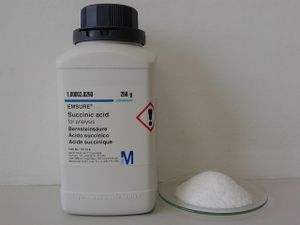Succinic acid
 Succinic acid sample and original bottle.
| |
| Names | |
|---|---|
| IUPAC name
Butanedioic acid
| |
| Preferred IUPAC name
Butanedioic acid | |
| Other names
Amber acid
Asuccin Ethane-1,2-dicarboxylic acid Katasuccin Spirit of amber | |
| Properties | |
| C4H6O4 | |
| Molar mass | 118.09 g/mol |
| Appearance | White solid |
| Odor | Odorless |
| Density | 1.572 g/cm3 (at 20 °C) |
| Melting point | 184 °C (363 °F; 457 K) |
| Boiling point | 235 °C (455 °F; 508 K) |
| 8.32 g/100 ml (25 °C) | |
| Solubility | Soluble in acetone, diethyl ether, ethanol, methanol Slightly soluble in dimethylformamide Insoluble in benzene, carbon disulfide, carbon tetrachloride, petroleum ether, toluene |
| Solubility in acetone | 2.7 g 100/ml |
| Solubility in chloroform | 0.02 g/100 ml |
| Solubility in diethyl ether | 0.88 g/100 ml |
| Solubility in ethanol | 5.4 g/100 ml |
| Solubility in glycerol | 5 g/100 ml |
| Vapor pressure | 1.91·10-7 mmHg (25 °C) |
| Acidity (pKa) | pKa1 = 4.2 pKa2 = 5.6 |
| Hazards | |
| Safety data sheet | FisherSci |
| Flash point | 160 °C (open cup) 206 °C |
| Lethal dose or concentration (LD, LC): | |
| LD50 (Median dose)
|
2,260 mg/kg (oral, rat) |
| Related compounds | |
| Related compounds
|
Malonic acid Tartaric acid |
| Except where otherwise noted, data are given for materials in their standard state (at 25 °C [77 °F], 100 kPa). | |
| Infobox references | |
Succinic acid is an organic compound, a dicarboxylic acid with chemical formula (CH2)2(COOH)2. The name derives from Latin succinum, meaning amber, from which the acid may be obtained.
Contents
Properties
Chemical
Succinic acid will react with sodium carbonate in aqueous solution to give sodium succinate.
Physical
Succinic acid is an odorless white crystalline solid, soluble in water, methanol, but less soluble in diethyl ether.
Availability
Succinic acid can be bought from various wine-making suppliers. It is also sold as plant growth stimulator, though in this form it's very expensive.[1]
Lastly it can be bought from chemical suppliers and online.
Preparation
Succinic acid was historically obtained from the distillation of amber.[2]
Succinic acid can be obtained from the fermentation of wines, along with acetic acid.
A more convenient route involves the partial hydrogenation of maleic acid.
Oxidation of 1,4-butanediol will yield succinic acid.
Carbonylation of ethylene glycol will also yield succinic acid.
Projects
- Make polyesters
- Make fumaric acid
- Make succinic anhydride
- Synthesis of 1,4-butanediol
Handling
Safety
Succinic acid may be irritant and should be handled with care.
Storage
Succinic acid should be kept in closed bottles, away from volatile compounds.
Disposal
No special disposal is required.
References
- ↑ https://www.amazon.com/Fertilizer-Amber-Plant-growth-stimulator/dp/B079BT7H4G
- ↑ http://digicoll.library.wisc.edu/cgi-bin/HistSciTech/HistSciTech-idx?type=turn&id=HistSciTech.Cyclopaedia01&entity=HistSciTech.Cyclopaedia01.p0122&q1=Spirit%20of%20Amber